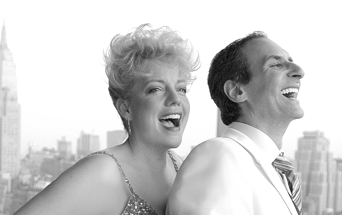Mark Nadler, K.T. Sullivan pay musical tribute to a Broadway giant
There was once a day—so they say—when you could walk out of Broadway’s newest show singing some song from it, or two, or three, you’d just heard for the first time in your life. Tune, words, and all.
Well, it wasn’t Broadway, it was the Algonquin, and it wasn’t until after the bus ride home, and the songs weren’t exactly new, but I went to sleep singing—in my head—“On the Sunny Side of the Street” and woke up singing—in my head—“I Can’t Give You Anything But Love, Baby…”
Which was, as it happens, a reverse of the order in which Mark Nadler and K.T. Sullivan, strumming ukuleles, open and close their richly rewarding set at the Oak Room in celebration of the 100th birthday, this past July 15, of the woman who thought up the words of those two songs and a huge harvest of others that are no less woven into the very fiber—the emotional fiber—of many of our lives.
Her name was Dorothy Fields. Her profession: lyricist. Her lifetime: 1905-1974.
“A Fine Romance” is what the skillfully meshed Nadler/Sullivan team—he at the piano and in voice, she in voice and pink-clad glamour—call their centenary tribute to the woman who fed so much wit, brains, love, longing, regret, style, class—all bound up with on-the-mark American slang—into so many Broadway shows and Hollywood movies over so many years.
The composers she teamed up with over those years are another catalogue of the greats. Here are the ones Mark and K.T. call upon—Jimmy McHugh (the first, and most prolific), Jerome Kern (the biggie), Morton Gould, Arthur Schwartz, Oscar Levant, Albert Hague, Cy Coleman. Some of the others—Irving Berlin, Cole Porter, Harry Warren, Harold Arlen.
And here is one of many anecdotes with which Sullivan and Nadler salt the hour and a half of song and history with which they open the 25th fall season of cabaret at the Oak Room of the Algonquin: Radio’s Jonathan Schwartz, son of Arthur Schwartz, was out strolling with his father one day when papa suddenly said, “Let’s walk on Dorothy’s side of the street.”
This being the Algonquin, it’s fitting for its performers to recall one of that hotel’s most famous denizens, another Dorothy who had a way with words, Dorothy Parker.
“The two Dorothys had a lot in common,” says Nadler. “Both Jewish, both liked parties, both liked to drink. I have that in common too.”
But the Mark Nadler you meet here is not Mark Nadler, the wild man and gay caballero bouncing off the walls of cabaret clubs uptown and down. It is the restrained, respectful, almost at times the omniscient Mark Nadler—until, in a flash, he breaks free and wild in something like “Digga Digga Doo” (McHugh and Fields) or an almost impenetrable rapid-fire Cockney-accented patter song, “’Erbie Fitch’s Dilemma,” from the Fields and Albert Hague musical “Redhead.” (“The worst Cockney accent since Dick Van Dyke,” Nadler proudly confesses.)
And K.T. Sullivan? Well, she’s a beauty and a pro who can swing from tenderness to torch song (“I Must Have That Man,” by McHugh and Fields) in the flicker of an eyelash.
Dorothy Fields’ life had great highs and deep lows. She was the daughter of Lew Fields, the formidable comedian (Weber & Fields) and Broadway producer who didn’t want any of his children going into show business. So she became a teacher. But showbiz was in the blood.
At 23, she had the breakthrough hit—a kid, working with Jimmy McHugh—of “I Can’t Give You Anything But Love,” even if some long-forgotten, sour-faced critic put it down as “sickly” and “puerile.” At 30, she, with Jerome Kern, won the Oscar for “The Way You Look Tonight,” forever to be with us in George Stevens’s great “Swing Time,” via Astaire and Rogers.
But … but … she was married at 19 to a Park Avenue heart specialist with whom she never spent one night or, it would seem, one moment in bed (“A fine romance, my dear, this is / A fine romance, with no kisses”). She was subsequently long and happily married to businessman Eli Lahm, with whom she had two children (one of them the singer David Lahm), but in the 1950s she lost two beloveds, one after another, her brother Herb and her husband Eli, and after that she did not work for seven years.
It was only when, at a cocktail party in 1965, a young squirt of a piano player named Cy Coleman came up to her and nervily proposed they collaborate, that life began anew. You will remember the result. It’s on Broadway—again—at this very moment and it’s called “Sweet Charity.”
“If My Friends Could See Me Now” K.T. Sullivan and Mark Nadler proclaim, with zip, toward the close of their show. You can see them now, K.T. and Mark, and if you close your eyes you can see Dorothy Fields with them, through September 24 at the Oak Room of the Hotel Algonquin.
gaycitynews.com
































